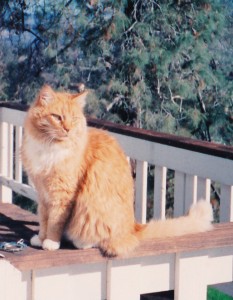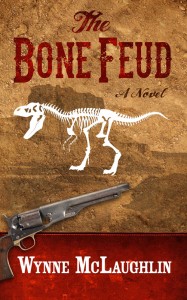Of Dinosaurs and Desperadoes—Writing “The Bone Feud”
 Wynne McLaughlin is a video game designer, screenwriter, and television writer. He is a member of the Writer’s Guild of America, west and the International Game Developers Association. His first novel, “The Bone Feud,” an action-packed true story of dinosaur bone hunters in the Wild West, will be available as a free download from Amazon.com on Tuesday, November 18th and Thursday, November 20th .
Wynne McLaughlin is a video game designer, screenwriter, and television writer. He is a member of the Writer’s Guild of America, west and the International Game Developers Association. His first novel, “The Bone Feud,” an action-packed true story of dinosaur bone hunters in the Wild West, will be available as a free download from Amazon.com on Tuesday, November 18th and Thursday, November 20th .
Of Dinosaurs and Desperadoes—Writing “The Bone Feud”
“An action adventure novel about dinosaur bone hunters in the Wild West? How did you come up with an idea like that?” Great question. For me, the journey that eventually led me to write The Bone Feud began when I was just five years old.
Today, the North Shore Shopping Center in Peabody, Massachusetts, is a huge, multilevel mall, but in the mid-1960s, it was an open-air shopping center with a small selection of kiddie rides at one end. The year I entered kindergarten the shopping center sponsored a dinosaur exhibit. They brought in a number of life-sized fiberglass models of dinosaurs on wheeled trailers and parked them beside the amusements for the kids to gawk at. There was a giant Tyrannosaurus Rex, a Stegosaurus, a Triceratops, and an enormous green Brontosaurus (which today we know to be an Apatosaurus) that looked very much to me like Dino, the family pet from one of my favorite cartoon shows, The Flintstones. I’ve no idea how accurate these representations were, only that, in the wide eyes of a five year old, they were magnificent. It was right then and there that my lifelong fascination with dinosaurs began.
I immediately proclaimed that when I grew up I wanted to be an “archaeologist” and dig up dinosaur bones, but my mother patiently explained to me that archaeologists don’t dig up dinosaur bones, and that what I actually wanted to be was a paleontologist.
In the years that followed I fell in love with all things science. My father took me to the Harvard Museum of Natural History to see real dinosaur skeletons. I began to collect rocks and a few small fossils. I became enraptured by the Apollo space programs and watched in the grainy footage of Neil Armstrong’s first steps on the moon in awe, on a tiny, flickering black and white television. I owned a chemistry set, a telescope, a microscope, and a working scale-model German steam engine that I’d won in a contest, for building a whacky Rube Goldberg machine that ate spaghetti. I was determined to become a scientist of some kind.
Science is Hard
My disillusionment came in junior high school when I discovered that a large part of any science degree involved advanced mathematics, something for which I had no natural talent. I was “numerically challenged,” but I loved to read, and for me, reading science fiction was the next best thing to studying science. I was such a voracious reader that eventually becoming a writer was inevitable.
I began to write screenplays and eventually moved to Los Angeles. I was in my early 20s, waiting tables and tending bar to pay my bills while I wrote. Eventually I got my break and ended up spending the better part of ten years writing for film and television. Today I make my living writing and designing video games.
The Bones of Contention
Before I left the film industry, around 2000-2001, I stumbled upon a nonfiction book by author and newspaper journalist Mark Jaffe. Entitled The Gilded Dinosaur: The Fossil War Between E.D. Cope and O.C. Marsh and the Rise of American Science, it detailed the history of the events known variously as “The Bone Wars” and the “Great Dinosaur Rush.” These events came about when two paleontologists made a remarkable series of discoveries, unearthing the remains of some of the greatest of the Jurassic dinosaur species we know today.
A straightforward re-telling of their story would have been somewhat dry, and ultimately quite depressing. These two men, Professor Edward Drinker Cope and Professor O.C. Marsh, were compulsive, jealous, driven men, and their bitter feud ultimately destroyed them both. But the events surrounding the story captured my imagination. This happened in the late 1870s at the height of the American Wild West. In the course of their travels, Cope and Marsh crossed paths with an amazing array of colorful characters who have been heavily romanticized in Western fiction over the years: Wild Bill Hickok, P.T. Barnum, the great Sioux leader Red Cloud, and many others. As I read their stories I began to see within them the bones of a fantastic adventure tale. I saw wonder and magic in these events, and I became determined to take their story and make it my own.
“The Truth Is Bound To Be Somewhere In Between.”
I made notes on all of the most interesting characters and events and wrote them on a series of index cards, posting them on a giant corkboard. I moved them around, combined some events, and altered others. I compressed timelines and took liberties with historical fact. In the end, I was satisfied with the structure of the story I’d created, but there was something missing. I needed a lens to view the story through. In short, I needed a storyteller.
At about this same time I read the fabulous revisionist western Little Big Man, by Thomas Berger. I’d become aware of the novel after seeing the Dustin Hoffman film of the same name. Both the novel and the film used a framing sequence—“bookended” scenes—that had Jack Crabb, the 121 year old main character, recounting his story in flashback to a curious historian.
I’d learned, from Mark Jaffe’s book, of a newspaperman who had published a number of stories about Cope and Marsh’s feud in the New York Herald. I made William H. Ballou my stand-in for the historian. But who would be telling him the story? I didn’t want to use Cope or Marsh, or any of their known associates. I wanted an outside perspective; someone peripherally involved with the story, but not a scientist. I wanted someone the reader would immediately identify with. An everyman.
 As I was sitting at my computer thinking about this, our cat leaped up onto my lap. He was an older cat, an orange tabby that had been with my wife for over a decade before I met her. He was the star of a hundred stories my wife had told me over the years. Garvey had the most adventuresome spirit of any animal I’d ever met. If only he could talk.
As I was sitting at my computer thinking about this, our cat leaped up onto my lap. He was an older cat, an orange tabby that had been with my wife for over a decade before I met her. He was the star of a hundred stories my wife had told me over the years. Garvey had the most adventuresome spirit of any animal I’d ever met. If only he could talk.
And just like that, my fictional hero James Garvey was born.
Breaking All The Rules
I finished the screenplay for The Bone Feud a few months later and was convinced that it was the best thing I’d ever written. I had my agent send it out, and I had some initial interest, but ultimately nothing came of it. It broke all the rules. It was a big budget period piece. It had an ensemble cast rather than one or two starring roles. And it was a Western. Westerns have been a hard sell since their golden age in the 50s and 60s. So, I put it on a shelf, but I never forgot about it. I’d fallen in love with this story and these characters. I couldn’t get it out of my head. I just couldn’t give it up.
 A few years ago I dusted it off and began to turn it into a novel. I knew, as written, it would be a short novel, and I briefly considered padding it out. I could add more descriptive text, additional scenes, or more back story to make it a more marketable length, but when it came right down to it, I didn’t want to do that. This was exactly the story I wanted to tell, and the way I wanted to tell it.
A few years ago I dusted it off and began to turn it into a novel. I knew, as written, it would be a short novel, and I briefly considered padding it out. I could add more descriptive text, additional scenes, or more back story to make it a more marketable length, but when it came right down to it, I didn’t want to do that. This was exactly the story I wanted to tell, and the way I wanted to tell it.
The Parts That People Skip
One of my writing heroes, the great Elmore Leonard, said, “When you write, try to leave out all the parts that readers tend to skip.” That was his style. He left out big descriptive paragraphs, kept things as lean and as fast-moving as possible, and revealed character through dialog. That’s what I tried to do. In the end, I wanted to create a novel that filled the reader’s head with images, and kept them compulsively turning pages.
My favorite early review said that one of the things they most enjoyed about The Bone Feud was that “It was almost like watching a movie in my head.” That was entirely my intention. I hope the rest of my readers feel the same way.
FREE Download!
You can download The Bone Feud for free today, Tuesday, Nov. 18th, or on Thursday, Nov. 20th, at Amazon.com. If you enjoy it, and you’re willing to post a review of the book on Amazon, I’ll be forever grateful.
Tags: dinosaur bones, free download, free ebook, free on Amazon, Harvard Museum of Natural History, The Bone Feud, Wynne McLaughlin